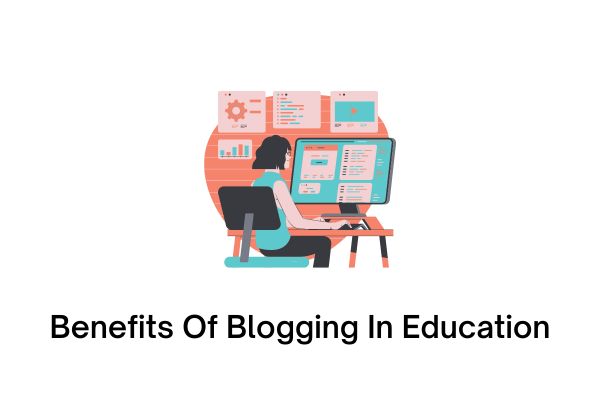What are the benefits of blogging in education? In today’s digital age, blogging has become an integral part of education. Gone are the days when students solely relied on textbooks and traditional classroom lectures to gain knowledge. With the advent of the internet, educators and students alike have embraced the numerous benefits of incorporating blogging into the educational curriculum. In this article, we will explore how blogging can revolutionize the way we learn, share information, and collaborate in the field of education.
1. Enhanced Writing Skills
Blogging provides students with a platform to express their thoughts and ideas in writing. By regularly composing blog posts, students can refine their writing skills and develop a strong command of the language. They can experiment with different writing styles, improve their grammar and vocabulary, and learn effective communication techniques. The informal nature of blogging allows students to express themselves freely, boosting their confidence and creativity.
2. Improved Critical Thinking
When students engage in blogging, they are encouraged to think critically and analyze various topics. Writing blog posts requires them to research, evaluate information, and present their own ideas in a logical manner. This process enhances their cognitive skills, enables them to think independently, and nurtures their ability to express informed opinions. Blogging prompts students to question existing knowledge, engage in meaningful discussions, and explore diverse perspectives.
3. Increased Collaboration
Blogging fosters a collaborative environment where students can interact with their peers, teachers, and even experts from different parts of the world. Through comments and feedback on their blog posts, students can engage in constructive conversations, share ideas, and receive valuable insights. This collaborative element nurtures teamwork, empathy, and cultural understanding. It also enhances the sense of community within the classroom, fostering a supportive and inclusive learning environment.
4. Digital Literacy
In this digital era, it is essential for students to be well-versed in technology and possess strong digital literacy skills. By incorporating blogging into education, students develop proficiency in using various online platforms, content creation tools, and multimedia elements. They learn to navigate the internet safely, evaluate online sources, and practice responsible digital citizenship. These skills are invaluable in today’s interconnected world and prepare students for future academic and professional endeavors.
5. Increased Motivation and Engagement
Traditional forms of assessment often fail to excite and motivate students, leading to a lack of engagement in their studies. However, blogging introduces an element of excitement and personalization to the learning process. By allowing students to choose their blog topics, personalize their writing style, and receive feedback from a wider audience, blogging makes learning more enjoyable and meaningful. This increased motivation and engagement result in better academic performance and a deeper understanding of the subject matter.
6. Real-World Application
One of the greatest benefits of blogging in education is its ability to bridge the gap between theoretical knowledge and real-world application. By regularly writing blog posts on subjects related to their field of study, students can relate what they learn to the real world. They can apply their knowledge in practical scenarios, thereby gaining a deeper understanding of the subject matter. This real-world application fosters critical thinking, problem-solving skills, and prepares students for future careers.
7. Personal Development
Blogging encourages students to reflect on their thoughts, experiences, and personal growth. By regularly documenting their journey, students can gain a better understanding of themselves, their strengths, and areas of improvement. They can develop a sense of self-awareness, self-expression, and self-confidence. Blogging also helps students develop discipline, time management skills, and a sense of responsibility towards their online presence.
8. Multimodal Learning
Blogging allows for the integration of various multimedia elements such as images, videos, and infographics into the learning process. This multimodal approach caters to different learning styles and enhances the overall learning experience. Students can use visual aids to illustrate their ideas, create video tutorials to explain complex concepts, and engage their audience through interactive elements. This innovative learning approach nurtures creativity, digital skills, and makes learning more engaging and interactive.
9. Authentic Audience
Unlike traditional classroom assignments that are only seen by the teacher, blogging provides students with a real and authentic audience. By publishing their work online, students can share their knowledge, ideas, and perspectives with people from around the globe. This exposure encourages them to produce high-quality work, take pride in their accomplishments, and receive constructive feedback. Having an authentic audience also helps students develop a sense of responsibility, as they become aware of the impact their words can have.
10. Lifelong Learning
Blogging instills a love for learning that extends beyond the classroom. By encouraging students to explore various topics of interest and share their findings through blog posts, they develop a habit of continuous learning. Blogging provides a platform for students to document their learning journey, revisit their ideas, and reflect on their growth over time. This fosters a lifelong love for knowledge and encourages students to become independent learners who seek learning opportunities even outside the classroom.
In conclusion, blogging offers a multitude of benefits in the field of education. From enhancing writing skills to fostering collaboration and critical thinking, blogging transforms the way we learn and share knowledge. By embracing blogging in education, we enable students to become active creators, critical thinkers, and engaged learners. The benefits of blogging extend beyond the boundaries of the classroom, empowering students with the skills and mindset necessary to thrive in the digital age. So let us join hands and embrace the limitless possibilities that blogging brings to education.
